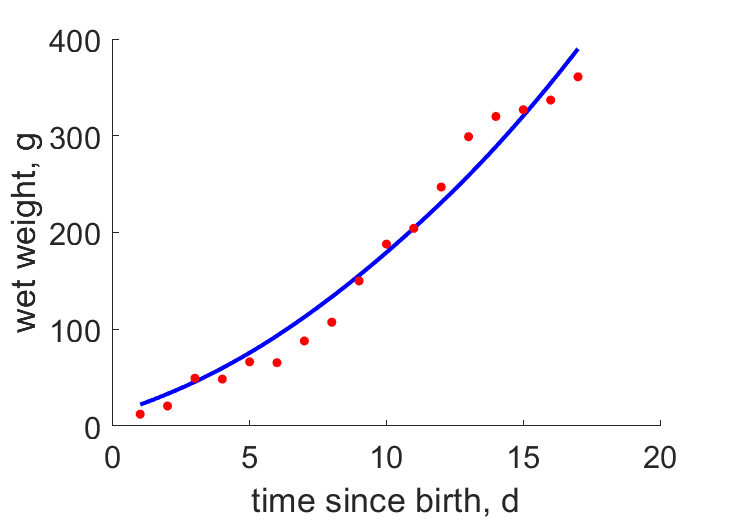Predictions & Data for this entry
| Model: std | climate: Aw, BWk, BSk, Cfb, Dfb | migrate: Ml | phylum: |
| COMPLETE = 2.5 | ecozone: TPa | food: biCi, biCvf, biCva | class: |
| MRE = 0.030 | habitat: 0iFm, 0iFe | gender: Dg | order: |
| SMSE = 0.003 | embryo: Tnpfm, Tnsfm | reprod: O | family: |
Zero-variate data
| Data | Observed | Predicted | (RE) | Unit | Description | Reference |
|---|---|---|---|---|---|---|
| ab | 17 | 16.61 | (0.02267) | d | age at birth | avibase |
| tx | 35 | 34.88 | (0.003412) | d | time since birth at fledging | Kopi1996 |
| tp | 105 | 107.8 | (0.02686) | d | time since birth at puberty | guess |
| tR | 1095 | 1095 | ( 0) | d | time since birth at 1st brood | avibase |
| am | 4490 | 4649 | (0.03551) | d | life span | avibase |
| Wwb | 12 | 12.26 | (0.02178) | g | wet weight at birth | Kopi1996 |
| Wwi | 513 | 502.9 | (0.01961) | g | ultimate wet weight for females | avibase |
| Wwim | 568.5 | 568.6 | (0.0001633) | g | ultimate wet weight for males | avibase |
| Ri | 0.01096 | 0.01106 | (0.009335) | #/d | maximum reprod rate | avibase |
Uni- and bivariate data
| Data | Figure | Independent variable | Dependent variable | (RE) | Reference |
|---|---|---|---|---|---|
| tW |  | time since birth | wet weight | (0.09708) | Kopi1996 |
Pseudo-data at Tref = 20°C
| Data | Generalised animal | Microcarbo africanus | Unit | Description |
|---|---|---|---|---|
| v | 0.02 | 0.04484 | cm/d | energy conductance |
| p_M | 18 | 579.5 | J/d.cm^3 | vol-spec som maint |
| k_J | 0.002 | 0.02263 | 1/d | maturity maint rate coefficient |
| k | 0.3 | 0.2863 | - | maintenance ratio |
| kap | 0.8 | 0.9685 | - | allocation fraction to soma |
| kap_G | 0.8 | 0.799 | - | growth efficiency |
| kap_R | 0.95 | 0.95 | - | reproduction efficiency |
Discussion
- Males are assumed to differ from females by {p_Am} only
- mod_1: v is reduced
- mod_2: Pseudo-data point k is used, rather than k_J; Data set tp and parameter t_R are added, the latter replacing clutch interval t_N. Postnatal T is based on PrinPres1991, see get_T_Aves. See further the revision page, theme puberty
Bibliography